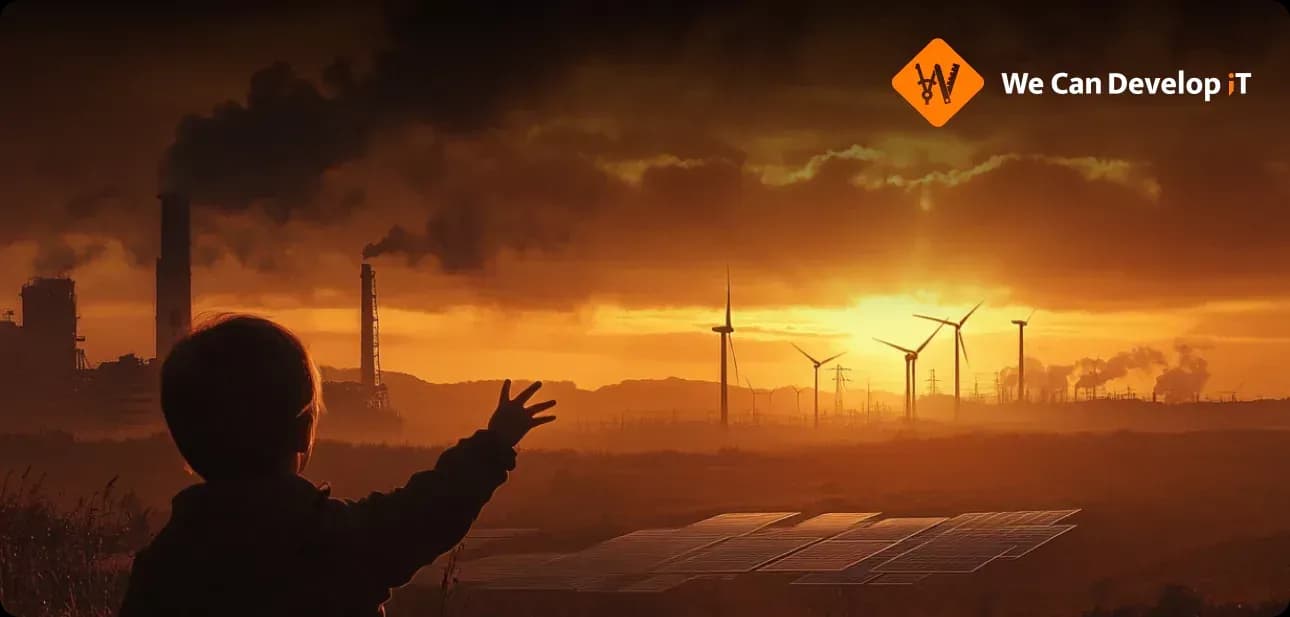Back
Updated at: February 11, 2026
Sustainable Development and Environmental Technologies

Solutions in the Field of Renewable Energy, Waste Recycling, and Carbon Footprint Reduction
"We did not inherit the Earth from our ancestors – we borrowed it from our children." – Native American proverb
Why Environmental Technologies Are Not a Trend, But a Necessity
Today, eco-friendliness is not just a social responsibility but a competitive advantage. Companies around the world are seeking technological solutions capable of ensuring sustainable development. And here, software and artificial intelligence (AI) play a special role — tools that allow for the scaling of green practices and making them more efficient.
Renewable Energy: the Energy of the Sun, Wind, and Data
"Without AI, managing renewable energy is like driving with your eyes closed." – from Google Sustainability report
Renewable energy sources are already the foundation of the energy system of the future. But for them to operate stably, not only solar panels and wind turbines are important, but also digital control systems. These include:
-
IoT sensors for tracking temperature, humidity, charge level, efficiency
-
EMS software (Energy Management Systems) — platforms that aggregate data and manage energy distribution
-
AI-based forecasting modules — accounting for weather, energy usage, economics
-
Microservices for inverters, batteries, and grid interaction
-
API interfaces for connecting to smart grids or mobile apps
Software development considerations include:
-
Operation in unstable network conditions
-
Real-time processing for mission-critical energy flows
-
Modularity for multi-vendor equipment (e.g., Modbus, OPC UA)
-
Robust cybersecurity measures
Case studies:
-
Tesla Solar Roof uses ML models to manage charging cycles
-
Ørsted applies AI for wind farm optimization
-
Google Project Sunroof uses AI to assess rooftop solar potential
Waste Recycling: Algorithms Instead of Sorters
Modern waste sorting addresses resource depletion and pollution. AI and computer vision improve efficiency and autonomy in harsh environments.
Key hardware components:
-
High-resolution and hyperspectral cameras
-
Industrial controllers and servo drives
-
Conveyor systems with intelligent gripping
Software architecture includes:
-
CNN-based neural networks with custom classifiers
-
Control modules with industrial protocol integration (OPC UA, EtherCAT)
-
Edge computing for fast on-site processing
-
Secure model updates via network or offline transfer
Case studies:
-
TerraCycle integrates tracking software for reverse logistics
-
IBM enables over 90% accuracy in AI-based sorting
-
IKEA monitors ESG indicators across its supply chain
"AI doesn't just speed up recycling – it turns chaos into a resource." – IBM Sustainability Analysts
Reducing the Carbon Footprint: Measure, Reduce, Predict
Carbon footprint reduction is now a platform-level task. Companies implement AI-powered ecosystems and cloud solutions to analyze operations and emissions.
Typical solution structure:
-
Sensors for energy, fuel, and emissions tracking
-
Edge gateways or LTE modules
-
Cloud storage via AWS, Azure, or GCP
-
ESG analytics platforms (Microsoft Sustainability Manager, SAP, Envizi)
-
Reporting integration with GHG Protocol, ISO 14064, CSRD
-
Dashboards built on Power BI, Grafana, Looker
Development nuances:
-
Requires ETL pipelines to unify diverse data sources
-
Must be scalable and microservice-based
-
May combine custom modules with existing SaaS platforms
-
Low-quality or sparse data may require extra sensors or enrichment
Case studies:
-
Microsoft Cloud for Sustainability combines analytics with ESG reporting
-
Climeworks uses cloud platforms for live CO₂ capture monitoring
-
Schneider Electric EcoStruxure automates energy use and emission tracking
"Without software, the carbon footprint is just a guess. With software, it's a number you can work with." – Schneider Electric Report
Why AI and Software Development Are Core to Sustainability
AI does more than automate — it enables systems to adapt to external changes like demand spikes or supply chain delays.
Key expertise includes:
-
Cloud-native architectures (Kubernetes, serverless)
-
Data analytics pipelines (ETL, ML ops)
-
Resilient edge software for low-power environments
-
DevOps and infrastructure security
Ecology as a Growth Strategy
The merger of environmental and digital solutions is now a strategic norm. Businesses that invest in sustainable software become more appealing to customers, partners, and investors.
Conclusion: Digital Resilience As a New Reality
"The future of sustainability lies in the synthesis of nature and technology." – World Economic Forum Strategy
Technology is essential for sustainability. And it is AI and software that turn ideas into scalable, effective solutions.
What's Next?
At We Can Develop IT, we have the expertise to create these solutions — from data collection and processing to AI integration and platform deployment.
Whether you're building:
-
An energy management system,
-
An AI-powered waste sorting module, or
-
A digital ESG analytics platform
we’ll help you:
-
Define clear technical requirements
-
Select the right technologies and tools
-
Integrate hardware and software components
-
Build a scalable, resilient IT architecture
Contact us — and let’s make your business cleaner, smarter, and more sustainable.
Summary:
The article discusses the critical role of environmental technologies in promoting sustainable development through renewable energy, waste recycling, and carbon footprint reduction. It emphasizes that eco-friendliness is now a competitive advantage for companies, with software and artificial intelligence (AI) being vital tools for enhancing green practices. Renewable energy systems require digital control mechanisms, such as IoT sensors and energy management software, to operate efficiently. The integration of AI helps in forecasting energy needs based on various factors, ensuring stable energy distribution. In waste recycling, AI-driven algorithms and computer vision technologies are improving sorting efficiency, facilitating better resource management. Carbon footprint reduction is becoming a platform-level task, with companies leveraging AI to analyze emissions and operations through cloud solutions. The article highlights the importance of robust data analytics and system integration to accurately measure and manage carbon footprints. Businesses that invest in these technologies not only enhance their sustainability efforts but also increase their attractiveness to customers and investors. It concludes by asserting that the convergence of digital and environmental solutions is essential for achieving long-term sustainability goals. The company We Can Develop IT offers expertise in creating these innovative solutions to support organizations in their sustainability initiatives.
Read also:
sustainabledevelopment
environmentaltechnologies
renewableenergy
carbonfootprintreduction
AIforsustainability
wasterecycling
climatechange
cleantech
greenIT
energyefficiency
solarpanels
windenergy
smartgrid
IoTforenergy
EMSsoftware
AIforecasting
climateAI
carbontracking
GHGreporting
netzero
ESGanalytics
edgecomputing
cloudsustainability
digitaltransformation
cleantechnology
smartrecycling
industrialAI
environmentalsoftware
Kubernetesforsustainability
greenAI
energyAI
machinelearning
ESGreporting
sustainablesoftware
microservices
environmentaldata
energyplatform
smartfactory
sustainabilitysolutions
circulartechnology
AIwastemanagement
sustainablearchitecture




